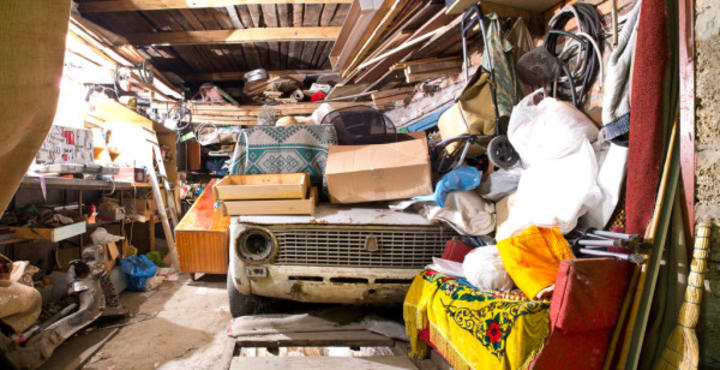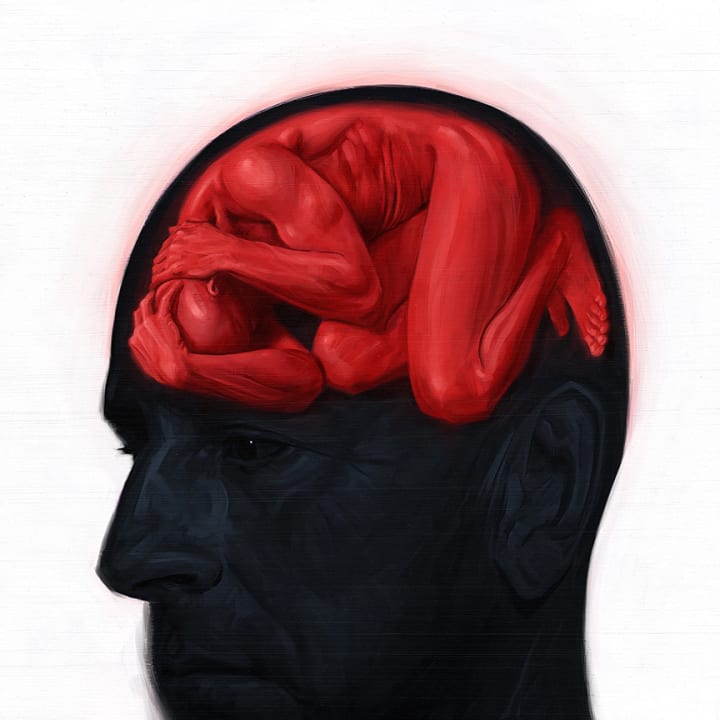My Wife is a Recovering Hoarder. This is How I Helped Her.
"The space you live in is a manifestation of your mind."

My wife's name is Samantha, and she's the love of my life. We've been together for five and a half years and we have two kids. Sam and I have a foundation that continues to stand against new trials and tribulations. This is one that I never thought I'd encounter. As a husband and father I want to give you insight on what I learned, and what it took to give my wife the breakthrough she needed.
Sam's Childhood.
When Sam was growing up, the hoarding didn't actually start in her family until she was about twelve years old. Based on what Sam has explained to me, the hoarding ramped up over time. The first time I walked into her home I noticed piles of dirty laundry that were about waist high. The kitchen was inaccessible. If you wanted to eat something, it was a challenge. This was the majority of the hoarding. Aside from a bit of trash buildup here and there, the kitchen and the laundry were the most noticeable. That was July of 2015. Now? I don't even want my kids over there. It's a legitimate health hazard.
I can't put into words what her parents' home has turned into. I'll say this: My son was born in December of 2016. This was about the time it got better, and then progressively worse soon after. Once toys were involved, that was it. Toys, clothes, memorabilia. And I have to say 'memorabilia' because memorabilia to you and me isn't memorabilia to a hoarder.

What to look out for.
I'm sure there are plenty of books on psychologists talking about this, but I'll simplify it for you.
A hoarder collects in two categories: Usefulness, and memorabilia.
Usefulness can mean one of two things. You can either keep it for the future, or it can be given to someone else. Now, a hoarder giving something away isn't impossible. It can be hard, but once they've decided to donate an item, then you're good. But if you can't find someone to take it, now you're back at square one. "Let me find someone else to give it to. Let's hold onto it a little longer." This can be a problem. It could take days, weeks, or even months to find someone depending on what the item is. Another issue is if the item just flat out sucks. Maybe it has a stain on it, or maybe it doesn't work right. We had a baby swing that made a godawful sound when it would start up. A bit of an issue when you're trying to get a newborn to sleep. Getting rid of that wasn't easy.
Memorabilia is the other category. You can't give memorabilia away unless a family member is willing to take it. Most of the time family isn't willing to do that. Like I said earlier, memorabilia to you and me isn't memorabilia to a hoarder. Memorabilia can be literally anything that has a memory attached to it, no matter how small the memory may seem. Depending on the severity of the hoarding you could go from keeping twenty or thirty items to easily over a hundred. How? Well, the items don't have to be big. Seashells, marbles, etc. Jars, containers, boxes full of memorabilia. If you have kids, this makes hoarding worse. Now you have memorabilia for days. Toys, stacks of art projects. The list goes on.
A hoarder can be capable of both of these categories, or even just one. But if you aren't sure why certain things are being hoarded, it's important to ask why the person is wanting to keep those things. Take notes, and make a plan.
The power of the mind.

The space you live in is a manifestation of your mind. If you are disorganized in your head, you'll eventually be disorganized in your home. If anxiety and depression are involved, you'll see trash buildup, clothes will be scattered, dishes will be piled up. Hoarding is a blend of these things. My wife has anxiety and depression. The worse her depression was, the worse her hoarding would become. The worse her hoarding became, the more depressed she was. Despite her enormous progress on defeating her hoarding tendencies, she still suffers from anxiety and depression. However, it's much more manageable.
If we were to compare the brain to a computer, the RAM would be how much the brain can do at once. Anxiety would be too many tabs open on a browser. Depression would be the computer freezing. Medication and counseling would be defragging. Hoarding in this case would be a Trojan virus. At some point my wife went from anxiety and organization (fun combination) to hoarding. And then the hoarding started to grow as time went on. If someone you love is seeking counseling for their depression/anxiety and they have hoarding tendencies as well, the counselor needs to know. It's easy to miss in the beginning, and it's a slow process. The longer you wait, the longer it'll take to undo what the mind has adjusted to.
In the beginning, it doesn't seem significant. But what happens when the hoarding is keeping people from coming over? If this has been an ongoing thing, there's a very high likelihood nobody will say anything. Only your brutally honest friends and family will tell you if your hoarding is getting out of control. For the majority, they'll go silent. They may drop a few hints in subtle ways, but that's basically it.
Also, watch out for enablers. These are almost always the ones you got your hoarding tendencies from. This was the hardest part for me because it involved talking to my wife about parts of her family. Not fun.
The first step in solving any problem...
Sam loves organizing, always has. She would tell me all the time that she would find better spaces for the things she wanted to hold onto. She recognized she had a problem. But a hoarder will still justify keeping an incredible amount of memorabilia and what that hoarder considers useful. This turned into several containers and shelving units holding items. At first, all would seem well. But make no mistake, hoarding is always a sign of a deeper problem. And for Sam, that was her depression and anxiety. And sure enough, the organization was gone. Those shelving units would be a catch-all and the containers would eventually hold random items. This is why I call hoarding a Trojan virus. It spreads and affects everything you do in your living space. It doesn't stop.
Compromising with your mental illness creates a false sense of security. You have to face the problem for what it really is.
My wife's breakthrough.
Sam ordered two toy boxes online. In a frustrated tone I asked her, "What are we planning to do with these?" She explained that she finally wanted to cut down on the toys she owned. Now, let's back up for a moment. Sam has attempted to throw away items before. Here were the results: Nausea, dizziness, fatigue, and anxiety. Listen to me, when a hoarder is moving at a snail's pace, they are working overtime. Encourage them to keep going. Remind them of how good they are doing. If it's getting too bad, tell them to take a break and then walk away from the trash bags and scattered items.
Back to the toy boxes. One day, we finally got around to throwing away something. It was a cheap $40 Christmas tree. She knew she had to throw it away and this was a decision she made on her own. She couldn't do it herself but she also wanted to walk with me to throw it out. The tree was a bit easier because it wasn't always there. There were no memories tied to that tree because I had just bought it a week before Christmas. We live in a 940 square foot apartment, so I made the decision of picking out a cheap tree and then throwing it away soon after storing away the ornaments. We simply had no space for it.
As we approached the dumpster, Sam slowed down. I encouraged her to keep going and I walked at her pace. I didn't rush her. When I went to throw it away I asked her, "Would you like to take a picture with us next to the tree before throwing it out? Have a memory of our Christmas for 2020?"
Then something happened.
Sam smiled and said, "I really love that you said that." This was the moment I realized what I just did. I showed her I cared about the item. Not only did I show her I cared, but I gave her a solution to her problem. A real solution. What is the purpose of photos? They're for memories. And here's where it got really interesting. When we threw out that swing I told you about earlier, I asked Sam if she wanted a photo of it. She said to me, "No, that's okay." This is when I realized that it wasn't the item itself, or even the memory of the item. It was the idea of the item. It was the idea of letting the item go. And as soon as I asked her if she wanted a picture, she quickly realized this as well. It finally shattered the belief system that was pushing on her hoarding tendencies. After that, I went out of my way to make sure she knew I was there for her and that I cared for every item she struggled to throw away. She no longer felt alone in her struggle against her hoarding tendencies.
Smaller items are a separate issue, however. A whole different beast. Once we had our two toy boxes, we had to start consolidating all of our son's toys. We both knew every toy wouldn't fit, so we started categorizing everything. Despite the fact that we were able to finish the toy situation, this put her in a depression. She asked me, "What if Jon notices several of his toys are missing?" I reminded her that we know what he plays with, and that he only played with the other toys when we would dig them out of the bottom of our old toy boxes. Not even a few minutes would pass before he would throw the toy to the side. I asked her, "What would Jon notice first: That a toy he doesn't regularly play with is missing, or the open space that we are creating for him?" She replied, "Oh my God, you're right." Toys are useful for kids, not parents. As soon as a kid doesn't play with a toy anymore, it fulfilled its purpose. Once a parent is holding onto a toy that their kid doesn't play with, it becomes memorabilia. Hoarders have trouble with this. But remember, we solved the memorabilia. It's nothing more than the idea of the item. And hey, you may want to take a picture here and there. That is totally fine. Just keep reminding the struggling individual that they are not alone in the fight. Remind them that you care for the item too.
What NOT to do.
The next time you slip on that rolling skate your kid doesn't play with, think twice before saying your first thought through your face hole. Don't refer to the hoarder's items as 'shit' or 'junk'. Refrain from complaining that things are in the way. If someone took your kid's teddy bear, you'd take that personal wouldn't you? That teddy bear belongs to your kid. That kid is an extension of yourself. Therefore, in your mind, that teddy bear is extension of yourself. When you call a hoarder's item 'shit', you might as well have called the hoarder 'shit'. If your spouse is a hoarder and they overhear you complain about their hoarded item being in your way, your spouse just heard you say that they are in the way. Believe me, I made all of these mistakes. If I hadn't, I probably could have helped with Sam's breakthrough much sooner.
Therapy is a must.
You can find therapy in just about anything. For my wife, this was watching child phycologists on TikTok. By seeing child phycologists talk about how kids react to clutter, Sam was able to see that her hoarding was affecting our children. Tip: The TikTok was about how children respond to toys. It's common for small children to throw toys around and make a mess when there are too many toys around them. They are not playing with the toys - they are expressing their frustration. This is what made Sam buy the toy boxes.
The last time Sam saw a counselor, she didn't mention her hoarding tendencies. She's seeing a counselor again soon and she intends on bringing them up. You don't want this to slide under the radar. Remember what I said earlier: Hoarding is always a sign of a deeper problem. It's better to start with the hoarding and then work your way backwards. It's a hard thing to talk about to a stranger, but you want to be sure it's addressed. You may even want to go with your significant other to therapy. Being emotional support played a huge role in the breakthrough, and it should go without saying. Still, many of us get so caught up in how we feel instead of taking into account what the other person is feeling.
It is important to note here that every hoarder is in a different part of the process. Some see they have a problem, others don't. Some are willing to try to seek help, some aren't. This is why therapy is so important. If you have depression and hoarding tendencies, yet you don't see that reality, then your loved ones can only do so much. It's not realistic to take responsibility for something you don't feel responsible for.
When Sam began conquering her hoarding tendencies, other emotions came out. Her mom is also a hoarder, and she was the one enabling my wife. Once Sam saw this for herself, she realized how badly she needed to seek counseling.

Final thoughts.
I hope this helps. Sam really wanted me to publish this here and I'm glad that I did. I normally write paranormal articles, but this was something I felt compelled to do. If you are interested in anything paranormal related, I highly recommend checking out my other articles!
*Artist Credits*
carts: https://www.deviantart.com/carts
Claparo-Sans: https://www.deviantart.com/claparo-sans
Follow me on social media for paranormal content and more!
Facebook: facebook.com/izzycentric
Instagram: instagram.com/izzycentric_official
TikTok: @izzycentric
About the Creator
Israel Petty
I'm a paranormal author, researcher, and investigator. If you wanna know in depth what I study, I recommend checking out my latest book Theories of a Paranormal Investigator on Amazon. I also have a few chapters from my book on Vocal.






Comments
There are no comments for this story
Be the first to respond and start the conversation.